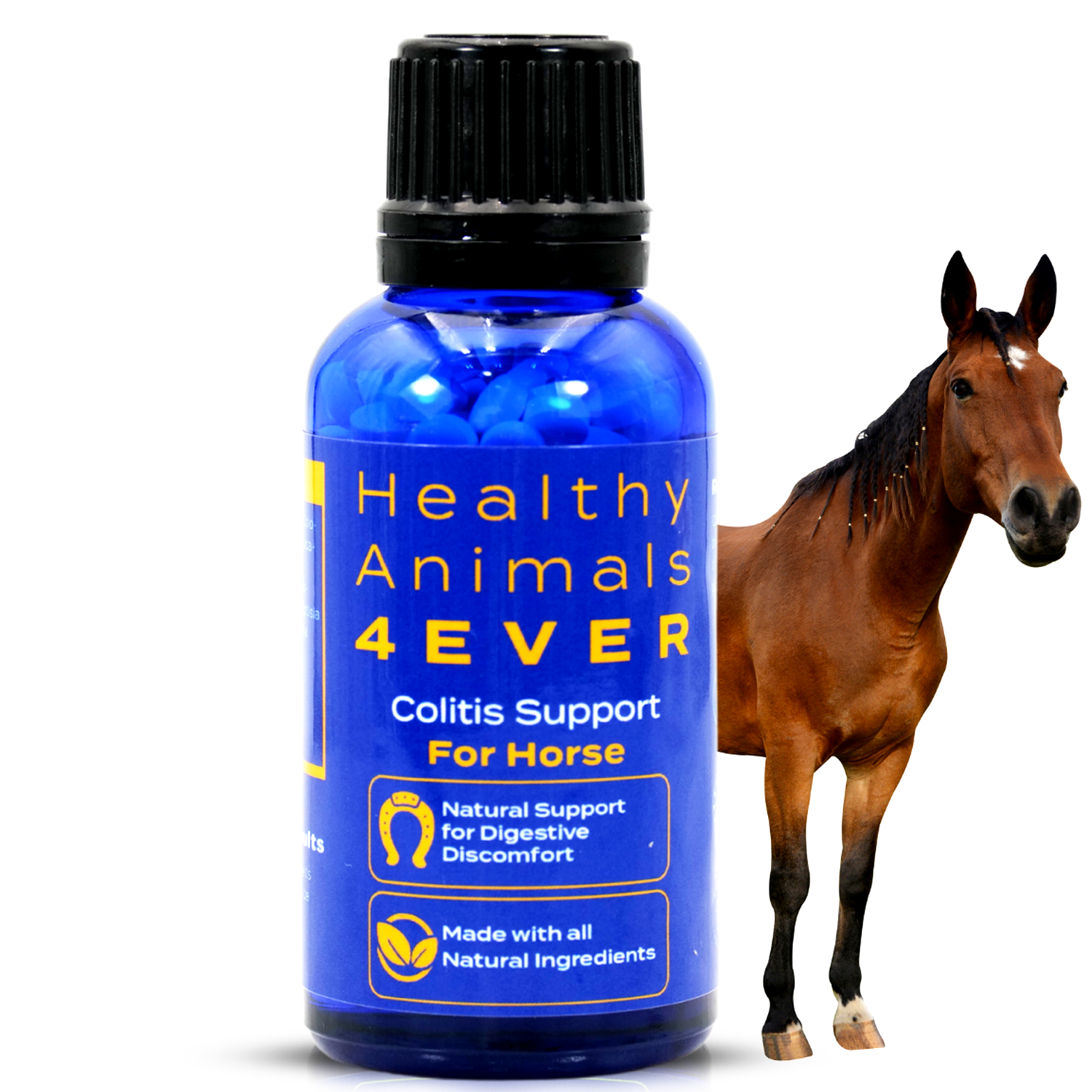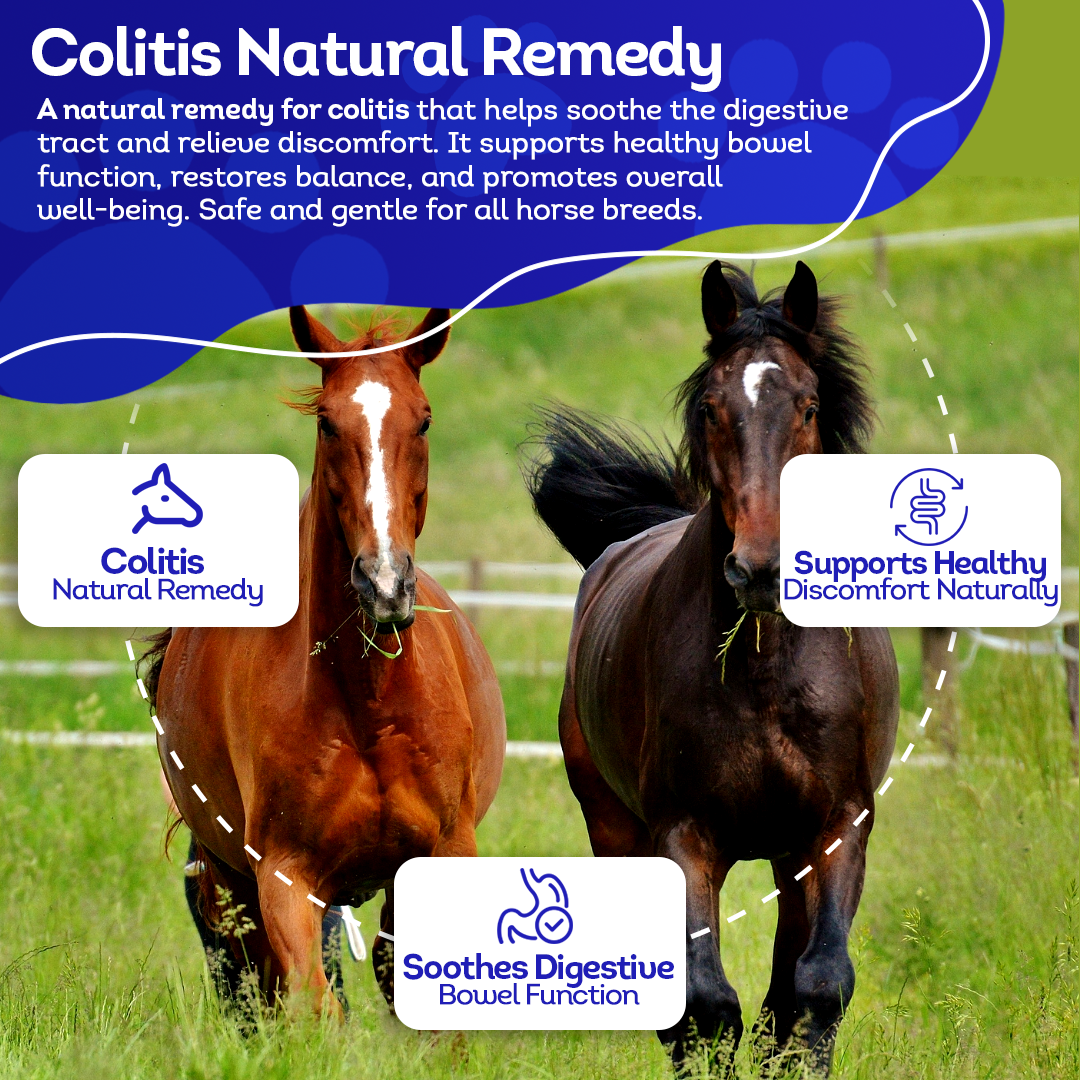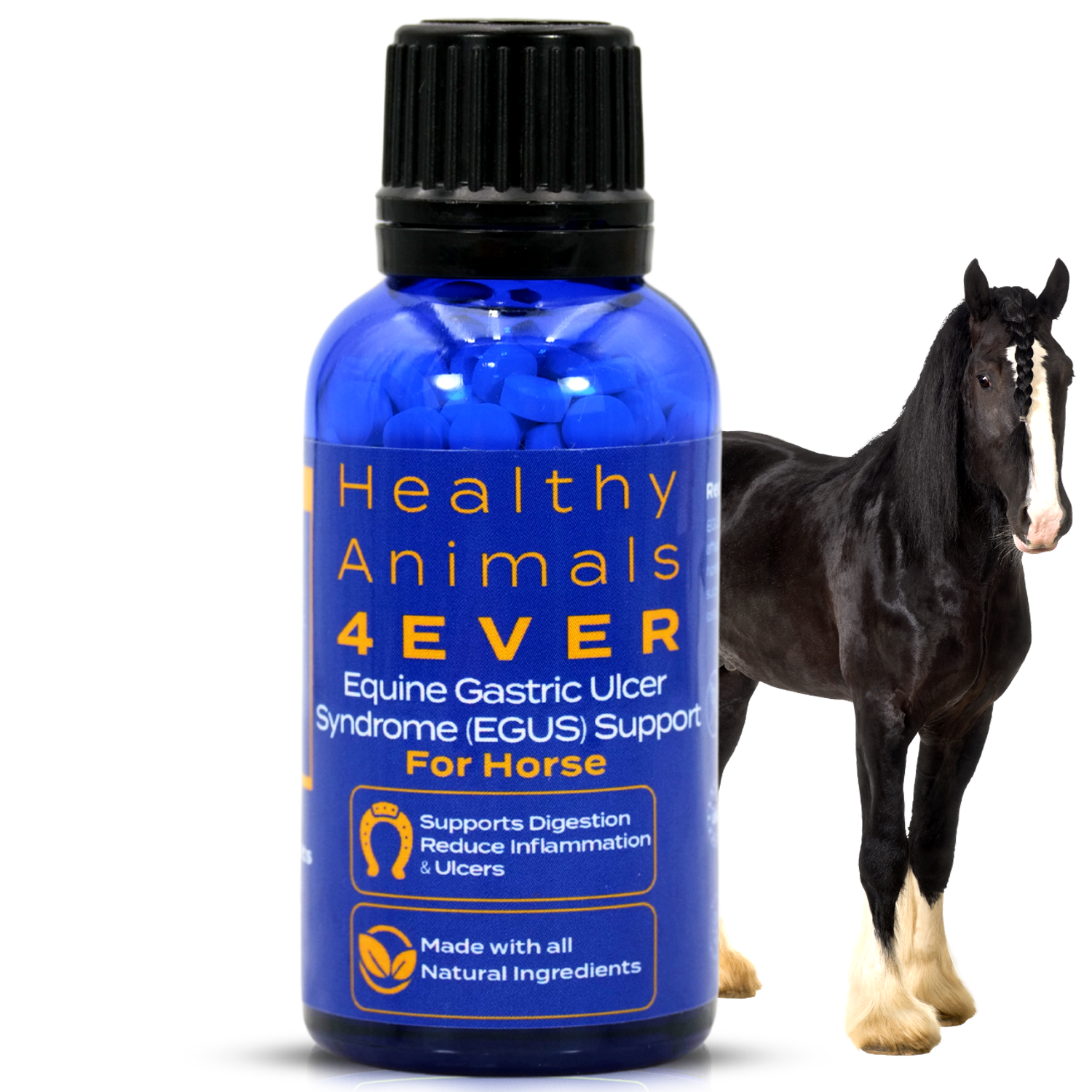Equine Digestive Wellness: Natural Remedies for Digestive Disorders in Horses
HORSE COLIC SUPPORT may help with colic, abdominal pain, discomfort, bloating, and gas.
When you are well-prepared and knowledgeable about horses and their health problems, you can quickly react and prevent some disorders. This article will discuss a horse's gastrointestinal tract and how you can recognize and treat specific issues that might develop.
Let's learn a little bit about the GI tract in horses.
The Horses' Digestive System
The digestive tract of horses is well-adapted to their natural forage diet, which consists mainly of grasses and hay. Horses are herbivores with a specialized digestive system that efficiently extracts nutrients from plant material. It's important to note that horses have a sensitive digestive system, and their diets should be carefully managed to prevent digestive disorders such as colic and gastric ulcers. Providing a consistent supply of high-quality Forage, regular feeding schedules, and avoiding sudden dietary changes are essential for maintaining a healthy digestive system in horses.
Parts of a horse's digestive tract are the:
- Mouth: Digestion begins in the mouth, where horses use their incisor and cheek teeth to grind and break down food. Saliva is mixed with chewed food, which aids in the initial stages of digestion.
- Esophagus: After being chewed and mixed with saliva, the food bolus moves down the esophagus, a muscular tube that connects the mouth to the stomach. Peristaltic contractions help propel the food toward the stomach.
- Stomach: The horse's stomach is relatively small, comprising only about 10% of the total digestive capacity. The stomach produces gastric juices, including hydrochloric acid and enzymes, which aid in the breakdown of food. However, horses have a continuous acid flow into the stomach, making them susceptible to gastric ulcers.
- The small intestine is where most nutrient absorption occurs. It consists of three sections: the duodenum, jejunum, and ileum. Enzymes from the pancreas and bile from the liver help break down carbohydrates, proteins, and fats into smaller molecules for absorption.
- Cecum is a large fermentation chamber located at the junction of the small and large intestines. It plays a crucial role in the digestion of fibrous material. Bacteria in the cecum ferment cellulose and other complex carbohydrates, breaking them down into volatile fatty acids, which the horse can absorb.
- The large colon is the primary site of water absorption and microbial fermentation. It is divided into several segments: the right ventral colon, sternal flexure, left ventral colon, pelvic flexure, left dorsal colon, diaphragmatic flexure, and right dorsal colon.
- The small colon is the final section of the digestive tract before the rectum. It is responsible for further water absorption and the formation of fecal balls.
- Rectum is the terminal part of the digestive tract, where fecal matter accumulates before being eliminated through the anus.

Most common horses' digestive disorders and treatments
Horses are prone to digestive disorders ranging from mild discomfort to life-threatening conditions.
- Colic
Colic is a general term used to describe abdominal pain in horses. It is one of the most common and potentially severe disorders in horses, responsible for around 30% of adult horses deaths in the US. It can have various causes, including gastrointestinal blockages, gas accumulation, intestinal twisting, or inflammation. Colic can range from mild discomfort to a life-threatening condition requiring immediate veterinary attention.
HORSE COLIC SUPPORT may help with colic, abdominal pain, discomfort, bloating, and gas.
Causes of colic
- Gastrointestinal disturbances - intestinal blockages, gas accumulation, impactions, torsions (twists), or inflammation can lead to colic.
- Dietary factors - sudden changes in diet, feeding large amounts of grain, insufficient roughage, or poor-quality forage can contribute to colic.
- Parasites - internal parasites, such as strongyles or tapeworms, can cause colic in horses.
- Dental problems - dental abnormalities or issues with the horse's teeth can affect chewing and digestion, leading to colic.
- Management and environmental factors - stress, irregular feeding schedules, limited access to water, confinement, and other management or environmental changes can increase the risk of colic.
Signs and Symptoms
- The horse repeatedly looks at the flank or kicks at the abdomen
- Pawing the ground or repeatedly lying down and getting up
- The horse is rolling or attempting to roll excessively
- Lack of appetite or decreased feed intake
- Abnormal gut sounds (increased or decreased)
- Elevated heart rate and/or increased respiratory rate.
- Sweating, restlessness, or signs of discomfort.
If you recognize any of these symptoms, contact a veterinarian immediately. Colic can worsen rapidly, so prompt veterinary intervention is crucial. Until the vet arrives, you may be advised to walk the horse slowly to help relieve discomfort and prevent rolling. Remove any food to avoid further ingestion. Provide access to clean water, but do not allow the horse to drink excessively.

Diagnosis and Treatment
The veterinarian will perform a thorough physical examination, including listening to gut sounds and rectal palpation, to assess the colic's severity and potential cause. Additional diagnostic tests such as bloodwork, ultrasound, or abdominal X-rays may be recommended to aid the diagnosis.
Treatment will depend on the underlying cause but may include pain medication, administration of fluids, laxatives, or surgery in severe cases.
Prevention
- Establish a consistent feeding schedule with regular access to high-quality Forage.
- Make dietary changes gradually and avoid sudden increases in grain intake.
- Maintain a parasite control program.
- Provide ample clean water at all times.
- Minimize stress and environmental changes.
Remember, colic in horses should never be taken lightly. Early detection, prompt veterinary care, and appropriate treatment are essential for a positive outcome.
Natural remedies
Some natural measures can be taken to help support the horse's comfort and recovery. These natural treatments can complement veterinary care and aid in managing colic symptoms. However, always consult with a veterinarian before implementing any natural remedies. Here are some natural approaches that you can consider:
- Provide access to fresh water: Ensure that clean water is always available to the horse. Proper hydration can help prevent impactions and aid in the passage of ingested material through the digestive tract.
- Movement and walking: Gentle exercise like walking may help alleviate discomfort and encourage gut motility. Consult with your veterinarian regarding the appropriate level of exercise based on the severity of colic and the horse's specific condition.
- Herbal remedies: Some herbal supplements or teas may relieve mild colic symptoms. Herbs traditionally used for digestive support in horses include chamomile, peppermint, ginger, and fennel. Always consult a knowledgeable equine herbalist or veterinarian for appropriate dosages and recommendations.
- Probiotics: Probiotics are beneficial bacteria that can help restore and maintain a healthy gut microbiome. They may aid in digestion and support gut health in horses. Probiotics can be given as supplements or fermented foods like yogurt or kefir. Consult with your veterinarian to select an appropriate probiotic for your horse.
- Aloe vera juice: Aloe vera has been used to soothe the digestive tract and promote healing in humans and animals. Small amounts of aloe vera juice can be added to the horse's feed or water, but consult your veterinarian for appropriate dosages to ensure no contraindications.
- Stress management: Minimize stress and environmental changes as much as possible, as stress can contribute to colic in horses. Maintain a consistent feeding and exercise routine, and provide a calm and stable environment for the horse.
Working closely with your veterinarian to determine the cause of colic and the most appropriate treatment plan for your horse's specific condition is essential.
- Gastric Ulcers
Gastric ulcers are erosions or sores that develop on the lining of the horse's stomach. They are common digestive disorders in horses that can cause discomfort and affect their overall health and performance. Gastric ulcers occur when there is damage to the lining of the horse's stomach, often due to prolonged exposure to stomach acid.
HORSE EQUINE GASTRIC ULCER SYNDROME SUPPORT It may help with inflammation and poor digestion.
Causes
- Frequent or prolonged exposure to stomach acid - horses produce stomach acid continuously. When the acid is in contact with the stomach lining for extended periods, it can lead to ulceration.
- Irregular feeding schedule - horses have evolved to graze for most of the day. When they experience long periods without food, stomach acid can accumulate and irritate the lining.
- High-starch diet - feeding large amounts of grain or concentrates can increase acid production and decrease the protective mucus layer in the stomach, making the horse more susceptible to ulcers.
- Stress - intense exercise, transportation, competition, changes in routine or environment, and other stressors can contribute to developing gastric ulcers in horses.
Symptoms
- Decreased appetite or picky eating
- Weight loss or poor body condition
- Poor performance, lack of energy, or reluctance to work
- Dull coat or poor coat condition
- Mild to severe colic episodes.
- Behavioral changes, such as irritability or reluctance to be touched
- Teeth grinding (bruxism) or excessive salivation

Diagnosis and treatment
Veterinarians can diagnose gastric ulcers through clinical signs, physical examination, and diagnostic procedures such as gastroscopy. Gastroscopy involves inserting a small camera through the horse's nose and into the stomach to visualize and assess the presence and severity of ulcers.
Treatment often involves medications to reduce stomach acid production and promote the healing of the ulcers. Proton pump inhibitors (e.g., omeprazole) are commonly used to suppress acid production and allow ulcers to heal. Treatment duration can vary depending on the severity of the ulcers. Dietary management is crucial, including providing a consistent source of high-quality Forage and minimizing periods of fasting. Feeding smaller, more frequent meals can help buffer stomach acid and reduce ulcer risk.
Prevention
Stress reduction strategies are essential, such as maintaining a consistent routine, providing ample turnout, and appropriately managing workload and exercise levels.
- Provide access to free-choice, good-quality Forage, such as pasture or hay, to promote continuous grazing behavior and buffer stomach acid.
- Avoid prolonged fasting periods and ensure horses can access food or Forage regularly.
- Minimize stress and maintain a consistent routine for the horse.
- Evaluate and adjust the diet, considering the horse's specific nutritional needs and digestive health.
- Regular veterinary check-ups and monitoring can help identify and address ulcer-related issues early.
Natural remedies
Some natural remedies and management strategies can be used to support the healing process and promote gastric health.
- High-Quality Forage: Providing access to free-choice, high-quality Forage is essential for horses with gastric ulcers. Good-quality hay or pasture grazing allows for continuous fiber intake, which helps buffer stomach acid and maintain a healthy digestive environment.
- Grazing time: Allowing horses to graze for extended periods and mimicking their natural grazing behavior can help reduce the exposure of the stomach lining to gastric acid. If pasture grazing is impossible, consider using slow-feed hay nets or multiple smaller hay feedings throughout the day.
- Aloe Vera juice has been used to support digestive health in horses.
- Slippery elm is an herb known for its soothing properties on the gastrointestinal tract. It forms a gel-like substance when mixed with water, which can help protect and soothe the stomach lining. Consult a veterinarian or an equine herbalist for appropriate dosages and administration methods.
- Marshmallow root is another herb that can help soothe and protect the stomach lining. When mixed with water, it forms a mucilaginous coating, providing a protective layer against stomach acid. Seek guidance from a veterinarian or equine herbalist for proper dosages and administration methods.

Other possible gastrointestinal problems
- Colitis
Colitis refers to inflammation of the large intestine (colon). Bacterial or viral infections, parasites, dietary changes, or stress can cause it. Symptoms of colitis include diarrhea (which can be severe and watery), fever, dehydration, and abdominal discomfort.
As a part of natural treatment, you can consider the following dietary approaches:
- Forage: provide high-quality Forage such as grass, hay, or pasture. Monitor the horse's tolerance for certain types of Forage and consider soaking the hay to reduce dust and potential irritants.
- Elimination diet: An elimination diet may be recommended to identify specific food allergies or sensitivities that may exacerbate the colitis. This involves removing certain feed ingredients and gradually reintroducing them while observing the horse's response.
- Probiotics and prebiotics: Consult with a veterinarian to determine if probiotics or prebiotics are appropriate for your horse. These supplements can help restore the balance of beneficial bacteria in the gut and support a healthy digestive system.

- Impaction
Impaction occurs when a mass of food or other material blocks the normal movement of ingested material through the digestive tract. Common sites of impaction include the large colon and the small colon. It can be caused by insufficient water intake, inadequate fiber in the diet, or poor dental health. Symptoms include reduced or absent fecal output, abdominal distension, and signs of discomfort.
- Choke
Choke occurs when food or other material becomes lodged in the esophagus, obstructing the passage of ingested material. It can be caused by eating too quickly, insufficient chewing, or consuming dry or poorly-soaked feed. Signs of choking include difficulty swallowing, coughing, nasal discharge, and stretching out the neck.
- Enteroliths
Enteroliths are mineral concretions that can form in the intestines of horses. They typically develop around a foreign object, such as a piece of sand or a small stone, and can grow in size over time. Enteroliths may cause intermittent or chronic colic symptoms, including abdominal pain and changes in bowel movements.

Natural remedies for GI problems
Besides the remedies we already mentioned, there are some more you can add to your horse's diet that can improve the Gi tract and minimize problems that might occur:
Yeast, specifically brewer's yeast or Saccharomyces cerevisiae, is sometimes used as a nutritional supplement for horses. It contains B-complex vitamins, amino acids, and minerals, which can provide some benefits. Some horse owners and trainers believe that yeast can help promote a healthy digestive system, improve feed utilization, and support the immune system. While yeast is not an essential component of a horse's diet, it can be added as a supplement to enhance overall health. It is commonly available in the form of powder or pellets, and it can be mixed with the horse's regular feed. It's important to follow the recommended dosage the manufacturer provides or consult a veterinarian to ensure appropriate supplementation.

Digestive enzymes. While horses have their endogenous enzymes, there are situations where supplemental digestive enzymes may be beneficial. These situations include horses with digestive disorders, older horses with reduced enzyme production, horses transitioning to a new diet, or horses with poor appetite or weight loss. Supplemental digestive enzymes for horses are typically derived from microbial or plant sources. These enzymes can help improve the breakdown of nutrients and enhance digestion. Some common digestive enzymes used in equine nutrition include amylase (breaks down carbohydrates), protease (breaks down proteins), and lipase (breaks down fats).
Kelp is a type of seaweed rich in vitamins, minerals, amino acids, and prebiotic fiber. It is also called a superfood. It can provide several potential benefits when added to a horse's diet. Potential advantages of including kelp in a horse's diet are:
- Source of minerals: Kelp contains a wide range of minerals, including iodine, iron, calcium, magnesium, and potassium. These minerals are essential for various bodily functions, including proper bone development, muscle function, and electrolyte balance.
- Thyroid Support: Kelp is mainly known for its natural iodine content. Iodine is necessary for producing thyroid hormones, vital in regulating metabolism. Adequate iodine levels support a healthy thyroid function.
- Coat and hoof health: The minerals and trace elements found in kelp can improve coat condition, promoting a healthy and shiny coat. Some horse owners also believe kelp can support healthy hoof growth and strength.
- Immune system support: Kelp contains antioxidants and certain compounds that may have immune-enhancing properties, helping to support the horse's overall immune function.
Spirulina is a type of blue-green algae that is sometimes used as a dietary supplement for horses. It is known for its high protein content, essential fatty acids, vitamins, minerals, and antioxidants.
Salt and electrolytes providing free access to a salt block or loose salt in a horse's pasture or stall is recommended. Horses will naturally regulate their salt intake based on their needs. In hot weather or during intense exercise, a horse's salt requirements may increase, so additional salt supplementation or electrolyte supplementation may be necessary. During intense exercise, sweating causes horses to lose electrolytes, particularly sodium and chloride. In such cases, supplementation can help replenish these lost minerals and maintain proper electrolyte balance. Electrolyte supplements are typically available in powder or paste form and can be added to the horse's feed or administered orally.
Peppermint is a commonly used herb in equine nutrition and is generally considered safe for horses when used in moderation. It is known for its distinct aroma and flavor, which can appeal to horses. It is used for palatability, appetite stimulation, stress reduction, and digestive support.

To conclude, if you suspect that your horse is experiencing any digestive disorder, it is crucial to consult a veterinarian promptly. Early diagnosis and appropriate treatment can help prevent further complications and ensure your horse's well-being.











